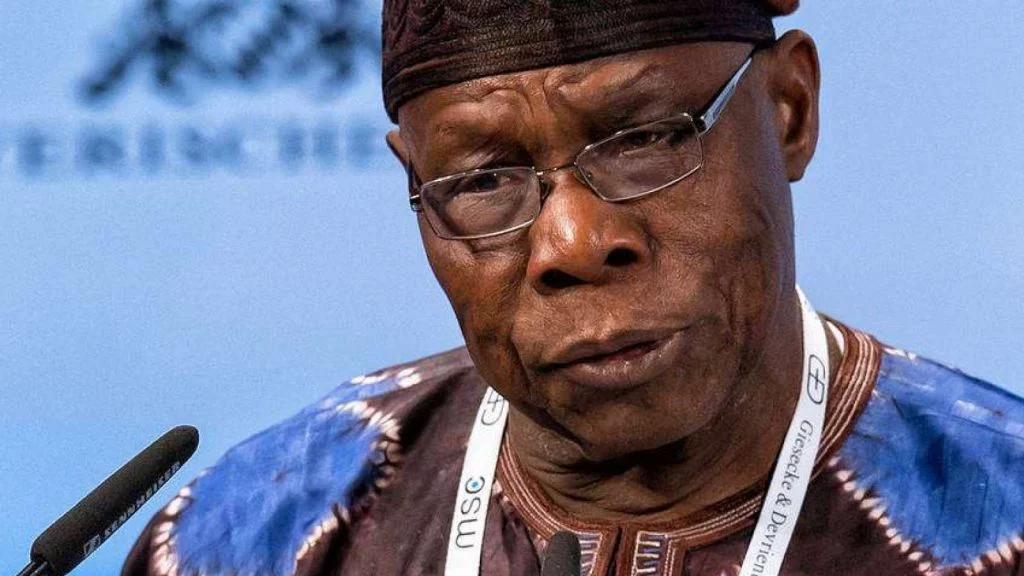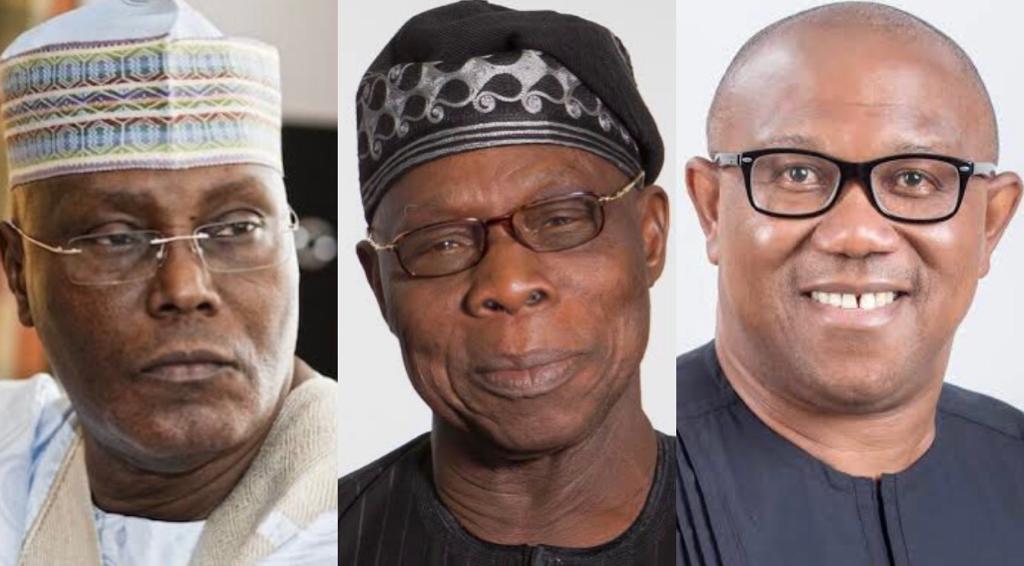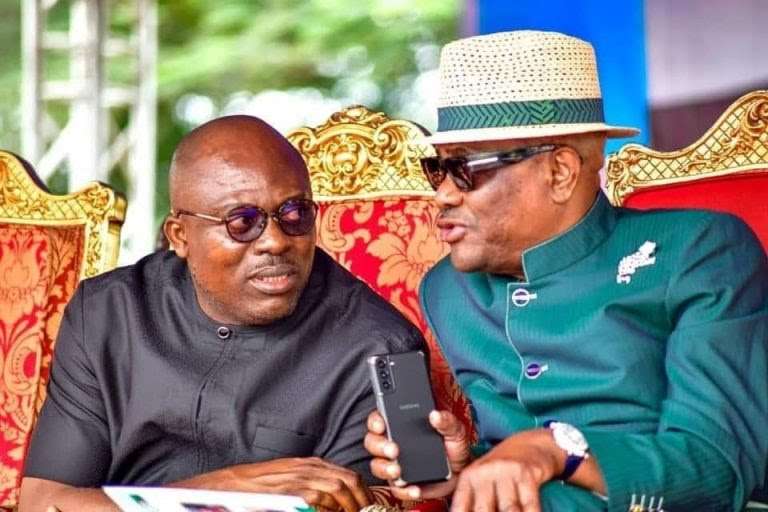Politics
Democracy: Where We Missed The Bus – Obasanjo

…Calls for a truly people oriented constitution
…Marvels at arrogance of incompetence and ignorance among leaders
Former President Olusegun of Obasanjo has said Nigeria’s democracy, after six decades of political independence, has remained stagnated, even deepened negativities, because leaders are not demonstrating capacities to provide transformative leadership that unites Nigerians.
Obasanjo, as Keynote Speaker, was among guests to Rivers state Governor Nyesom Wike Thursday in Port Harcourt where he reflected on “Respecting The Principles Of Democracy” at the Rivers State Government facilitated International Conference On “Deepening Democratic Culture And Institutions For Sustainable Development And Security In Nigeria”
Commending Wike for the gathering, Obasanjo said, “It has been a while since academics, politicians, policymakers and professionals from all over the world came together to discuss Nigeria. We sure need more opportunities to interrogate and understand our past and present, to design and plan our future”
In the highlights of his presentation, the former President attempted to to redirect stakeholders minds to where they missed the bus in the conviction that if the citizens were patient, humble, reflective, and willing, another bus (2023 elections) is just around the corner only if the people were ready to be active passengers.
He said though no two democracies were exactly alike, “However, citizens that live in democracies share common perspectives, expectations and commitments to basic tenets of democratic practice. And they may turn out to be beneficiaries or victims depending on the course of the process and practice of democracy.”
READ ALSO: No Leader Can Create New Nigeria Overnight – Obasanjo
Where We Miss The Bus
On Nigeria missing the bus, he said, “Our democracy has gone through twists, dives and turns since political independence. The best of our history has been the sustenance of democracy since the transfer of power to an elected government in 1999.
“However, there may be reasons to doubt how much lessons the leaders and followers have drawn from our past and how far they are willing to go to deepen, widen and strengthen democracy and democratic practice.
“The Constitution of the country provides the foundations that guide political activities. Democracy equally enables political actors to engage each other within set rules. But when actors confuse the beginning with the end, or adopt the infamous Machiavellian dictum that the end justifies the means, they get set for a race without boundaries, with no rules or where anything goes.
“An elite of commission agents, politicians, appointment hunters and influence peddlers is unlikely to appreciate the value of democracy and democratization. Everyone in this room, whether we admit it or not, is an expert in Nigerian politics.
“We all have opinions and we have prescriptions for all the problems of Nigeria. Yet, the country is not making progress. Most of us are experts in what we know little or nothing about and ignoramus in what is our duty and responsibility.
“We have tried all sorts of regimes, ideologies, planning strategies and personalities in power: the so-called new breed did not show that they were different. Equally, states run by professors, retired military officers and other professionals including teachers did not experience visible and substantial improvements.
READ ALSO: Insults, Lies Dominate Political Campaigns In Nigeria – Obasanjo
“True, there have been some outstanding leaders at various levels of power but no tree has ever made a forest; the good ones are few and far in between and did not form critical mass. The lack of conversations across fault-lines and primordial proclivities mean that our leaders are unable to share ideas and have durable and sustained policies for long enough time.
“This prevents useful cooperation, collaboration, stability and sustainability. It means whatever best practices are in one location remain there and may die there. If after six decades of political independence, our leaders are not showing clear capacities to provide transformative leadership that unites Nigerians and contains ethnic, religious, regional and clannish, selfish, even class proclivities, then, there is a problem.
“In fact, it is possible to declare that the ways in which we have practised our democracy have deepened contradictions, negative coalitions, distrust, disloyalty and unpatriotic tendencies within and between communities and constituencies all over the country.”
“We have tended so far to pursue the symptoms of the contradiction rather than focus on the causes and the disease remains stubbornly endemic. Unless we generate the courage and commitment to change course and do things better and differently, we may be heading for more trouble ahead.
“Democracy, when properly practised in the interest of peace, inclusion, national growth, development, security and stability, is supposed to address national problems, no matter how complex.
“In Nigeria, each new government behaves as if Nigeria is a newly found country. In fact, during campaigns, some leaders sound as if they plan to reinvent Nigeria and create new Nigerians overnight. That is because they miss the aspect of democracy that emphasizes continuity, stability and predictability.”
Prescriptions For Progressive Democracy
Going forward, Obasanjo said, “I marvel at the level of arrogance of incompetence and ignorance. The impunity is sickening. There are thousands of persons with integrity all over the country. Leaders need to identify and connect these persons with their communities and organisations to build a true national movement and commitment to democratic practice.
“Without reinventing the wheel therefore, let me state very clearly that the principles I have been talking about include, but certainly not limited to building and compacting a truly people-led and people-driven Constitution that they would own and defend against political predators of any form.
“This is the basic foundation that when you involve the people in the process, they understand it, make their inputs, see the document as their own; not only would they defend it, but it would also guide their political actions, alignments and realignments. Their welfare and well-being is involved and they can make meaningful contributions.”
The guest speaker noted that a new constitution should then be complemented by, “Citizen participation in rule-based political competition: How much internal democracy do the parties have; are the parties used to identify and train new leaders?”
He also recommended commitment to equality before the law and respect for human rights, tolerance and inclusion, accountability of leadership and public officials, respect for the constitution and the rule of law.
“By all means, these do not exhaust the tenets of democracy but they represent a good starting point. If a nation can get through these levels, all other tenets will be easy to achieve”, Obasanjo added.
Governor Wike in his remarks on the occasion, note that, “The efficiency of the judiciary in interpreting and enforcing the existing regulatory regime, including the laws, regulations and guidelines beyond reproach and the capacity and consistency of INEC and the Security Agencies to be firm, impartial and independent in the discharge of their functions are most crucial.
“Safeguarding and deepening our democracy lies with every citizen. We must have the courage to stand up for justice, the rule of law, an independent and courageous judiciary, and our rights and freedoms to vote and be voted in a transparent election.”
READ ALSO: ‘Keep Opinions To Self’, Buhari’s Media Team Slams Obasanjo
Former Governor of Ekiti State, Dr. Kayode Fayemi, Chairman of the occasion said, “Though, there are some political milestones achieved since1999, there is no doubt that we still have a longway to go in building a robust culture of power and politics that is both Democratic and sustaining.”
As part of the event, there was the unveiling of the book, “Bridging Rivers”, which captured the governorship legacy of Wike with the book launced under the chairmanship of former governor of Rivers State, Dr. Peter Odili.
VANGUARD
Politics
Obasanjo, Atiku, Obi Meet In Abuja

Former President Olusegun Obasanjo, former Vice President Atiku Abubakar and former Anambra State Governor Peter Obi met in Abuja on Saturday.
The trio were among prominent political figures who attended the Tambuwal Colloquium, titled “Leadership, Service and Statesmanship at 60,” held at the New Event Hall of the Transcorp Hilton Hotel, Abuja, in honour of the 60th birthday of former Sokoto State Governor and Senator, Aminu Waziri Tambuwal.
READ ALSO:Insecurity: What Sheikh Gumi Told Me After Visiting Bandits Hideouts — Obasanjo
Atiku confirmed his presence at the event in a post on his X handle, stating that he had arrived at the venue for the colloquium organised to mark Tambuwal’s milestone birthday.
The former vice president also shared images of himself, Obasanjo and Obi at the event.
The event attracted political leaders, statesmen and stakeholders from across the country.
Politics
PANDEF Wades Into Rivers Crisis, Sets Up Seven-member Mediation Team
Politics
Wike: Why Removing Fubara Will Be Difficult – Ex-Commissioner

A former Rivers State Commissioner for Information and Communication, Austin Tam-George, has said that attempts to impeach Governor Siminalayi Fubara would be difficult to sustain, citing what he described as the governor’s performance record and the lack of concrete allegations against him.
Tam-George made the remarks on Thursday while speaking on Prime Time on Arise Television, arguing that the impeachment process being initiated against Fubara was to scuttle his chance for a second term.
According to him, Governor Fubara has continued to place the needs of the people at the centre of his administration, with visible interventions in rural development, housing, education and healthcare.
He said this, in his view, has made it difficult for opponents to justify moves to remove the governor from office.
READ ALSO:Rivers Crisis: Bad People Won’t Prevail Over Us – Wike
Tam-George also called on the All Progressives Congress, APC, to intervene, arguing that the party should not allow what he described as the humiliation of a sitting governor.
He said: “Well, all I think he needs to do is to do exactly what he’s been doing from the beginning, which is to place the people at the center of gravity of his administration, prioritize the needs of the people, so that the people can see the direct impact of government action in their lives.
“And that’s exactly what he’s doing in terms of rural development, in terms of housing sector transformation, which I mentioned that he is doing the same in education sector and in health.
“So if he continues, if he persists in placing the people’s need at the center of focus of his administration, there is no way they are going to be able to justify this kind of shenanigans.
READ ALSO:BREAKING: Rivers Assembly Initiates Impeachment Proceedings Against Gov Fubara
“Because, if you look very carefully at the so called articles of impeachment, you will see that there is no specificity in terms of any infraction by the governor or his deputy.
“What they are trying to do is to make sure they scuttle the administration so that the governor doesn’t then get to the point where he will be seeking a second term.
“Let me be clear, just two days ago, Nyesom Wike was at one of the local governments, and he made it clear in a moment of epiphany, he made it clear that, look, if Governor Fubara were to get a second term in office, it will amount to his own political burial.
READ ALSO:[BREAKING] Fubara Vs Wike: Tension As Rivers House Of Assembly Suddenly Resumes Plenary
“So all of these things that we are seeing the so called impeachment proceedings they’ve initiated, it’s actually an effort to try to scuttle the prospects of the governor coming for a second term, and I don’t see how they will succeed.
“If you look at the so called articles of impeachment, as I said, they lack specificity in terms of the kind of infraction that they allege that the governor has committed. He has done nothing wrong, and they will see how the process will play out.
“My sense, and in fact, if I were to advise the governor, my sense is that he should just maintain the people, retain the people at the center of gravity of his administration, meet their needs, run a transparent administration as he always done, and then the truth will come out, and he will be able to defend the administration.
“I think the the governing APC should also step in because they can’t possibly allow the governor of the office with probably one of the best performance records in the country to be humiliated by some of these members of the assembly.”

 News5 days ago
News5 days agoHow To Calculate Your Taxable Income

 Metro4 days ago
Metro4 days agoEdo widow-lawyer Diabolically Blinded Over Contract Seeks Okpebholo’s Intervention

 Headline4 days ago
Headline4 days agoRussia Deploys Navy To Guard Venezuelan Oil Tanker Chased By US In Atlantic

 News4 days ago
News4 days agoExpert Identify Foods That Increase Hypertension Medication’s Effectiveness

 Politics3 days ago
Politics3 days agoAPC Leaders, Tinubu/Shettima Group Call For Wike’s Removal As FCT Minister

 Entertainment5 days ago
Entertainment5 days agoVIDEO: ‘Baba Oko Bournvita,’ Portable Drags His Father, Alleges Bad Parenting, Extortion

 Metro5 days ago
Metro5 days agoJUST IN: Court Grants Malami, Wife, Son N500m Bail Each

 Politics4 days ago
Politics4 days ago2027: Details Of PDP Leaders, Jonathan’s Meeting Emerge

 Politics3 days ago
Politics3 days agoWike A ‘Pestilence’ On Rivers, I Resigned Because Of It – Ex-Commissioner

 Headline2 days ago
Headline2 days agoScience Discovers Why Hungry, Broke Men Prefer Bigger Breasts

































